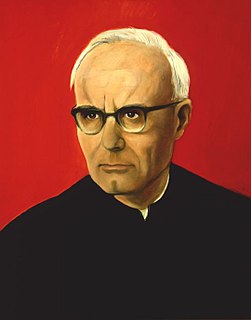A Quote by Barbara Brown Taylor
I live by the simplest, perhaps facile command that Jesus ever gave, which is to love God with the whole self and the neighbor as the self, and I find that's entirely consuming. To do those two things leaves me very little time to do much else.
Related Quotes
Perhaps the greatest barrier to revival on a large scale is the fact that we are to interested in a great display. We want an exhibition; God is looking for a man who will throw himself entirely on God. Whenever self-effort, self-glory, self-seeking or self-promotion enters into the work of revival, then God leaves us to ourselves.
Most of us love a non-self, or something extrinsic and apart from our inner life; but a mother's love during the time she is a flesh-and-blood ciborium is not for a non-self but for one that is her very self, a perfect example of charity and love which hardly perceives a separation. Motherhood then becomes a kind of priesthood. She brings God to man by preparing the flesh in which the soul will be implanted; she brings man to God in offering the child back again to the Creator.
There is perhaps no sort of self more subject to dangerous egotism than that which deludes itself with the notion that it is not a self at all, but something else. It is well to beware of persons who believe that the cause, the mission, the philanthropy, the hero, or whatever it may be that they strive for, is outside of themselves, so that they feel a certain irresponsibility, and are likely to do things which they would recognize as wrong if done in behalf of an acknowledged self.
Two ideas are psychologically deep-rooted in man: self-protection and self-preservation. For self-protection man has created God, on whom he depends for his own protection, safety and security, just as a child depends on its parent. For self-preservation man has conceived the idea of an immortal Soul or Atman, which will live eternally. In his ignorance, weakness, fear, and desire, man needs these two things to console himself. Hence he clings to them deeply and fanatically.
God’s love sets us free from the need to seek approval. Knowing that we are loved by God, accepted by God, approved by God, and that we are new creations in Christ empowers us to reject self-rejection and embrace a healthy self-love. Being secure in God’s love for us, our love for Him, and our love for ourselves, prepares us to fulfill the second greatest commandment: To love our neighbor as ourselves.
If the denial of death is self-hatred, as it is to deny our freedom and live in fear of death (which is to say, to live in a form of bondage), then the acceptance and affirmation of death is indeed a form of self-love. But I'd want to make a distinction between a form of self-love which is essential to what it means to be human, and a narcissism of self-regard, like Rousseau's distinction between amour de soi and amour propre, self-love and pride.
Only in love can I find you, my God. In love the gates of my soul spring open, allowing me to breathe a new air of freedom and forget my own petty self. In love my whole being streams forth out of the rigid confines of narrowness and anxious self-assertion, which make me a prisoner of my own poverty emptiness. In love all the powers of my soul flow out toward you, wanting never more to return, but to lose themselves completely in you, since by your love you are the inmost center of my heart, closer to me than I am to myself.
Those who have overcome self-will and become instruments to do God's work can accomplish tasks which are seemingly impossible, but they experience no feeling of self achievement. I now know myself to be a part of the infinite cosmos, not separate from other souls or God. My illusory self is dead; the real self controls the garment of clay and uses it for God's work.
But what is your true self is the God within you who became you, and when you realize that you are not yourself but you are he, then you discover that you and he are one, just as Jesus said. Jesus was a great master, and he had great teachings for the world, and when it says in the Bible, "All those who received him, to them gave the power to become the sons of God."
Perhaps, as we say in America, I wanted to find myself. This is an interesting phrase, not current as far as I know in the language of any other people, which certainly does not mean what it says but betrays a nagging suspicion that something has been misplaced. I think now that if I had any intimation that the self I was going to find would turn out to be only the same self from which I had spent so much time in flight, I would have stayed at home.
Self-indulgence takes many forms. A man may be self-indulgent in speech, in touch, in sight. From self-indulgence a man comes to idle speech and worldly talk, to buffoonery and cracking indecent jokes. There is self-indulgence in touching without necessity, making mocking signs with the hands, pushing for a place, snatching up something for oneself, approaching someone else shamelessly. All these things come from not having the fear of God in the soul and from these a man comes little by little to perfect contempt.





































